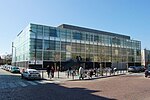Institut d'études politiques de Bordeaux

Institut d'études politiques de Bordeaux, also known as Sciences Po Bordeaux, is a French grande école located on the university campus of Pessac, Bordeaux. It is attached to the University of Bordeaux. Established in 1948, Sciences Po Bordeaux is one of the ten Institutes of Political Studies in France. According to article 2 of an 18 December 1989 decree, the mission of Institutes of Political Studies is : 1° to contribute to the training of higher civil servants as well as executives in the public, para-public and private sectors, notably in the State and decentralized communities 2° to develop the research in political and administrative sciences Alumni include many notable public figures, including one French Prime Minister, politicians and influential businessmen. The institute has approximately 1,300 students, admitted after a rigorous selection. Each year, Sciences Po Bordeaux receives about 3000 applications and only around 150 students will be accepted after the selection process, around 5% in average. This process makes it one of the most difficult French Political Institute to be accepted in.The academic course lasts five years, at the end of which a student graduates with the Diploma of Sciences Po Bordeaux (which is equivalent to a bachelor's degree) and with one of eighteen Masters offered by the institute. Sciences Po Bordeaux is a well integrated university, with more than 200 exchange-agreements with foreign universities around the world. It also proposes double degree programs with the universities of Stuttgart (Germany), Turin (Italy), Coimbra (Portugal), Madrid (Spain), Hong Kong (China), Moscow (Russia), Kingston (Jamaica) and Quebec (Canada).
Excerpt from the Wikipedia article Institut d'études politiques de Bordeaux (License: CC BY-SA 3.0, Authors, Images).Institut d'études politiques de Bordeaux
Allée Ausone, Bordeaux
Geographical coordinates (GPS) Address Phone number Website External links Nearby Places Show on map
Geographical coordinates (GPS)
| Latitude | Longitude |
|---|---|
| N 44.798541 ° | E -0.614129 ° |
Address
Sciences Po Bordeaux
Allée Ausone 11
33607 Bordeaux, Brivazac-Candau
Nouvelle-Aquitaine, France
Open on Google Maps






